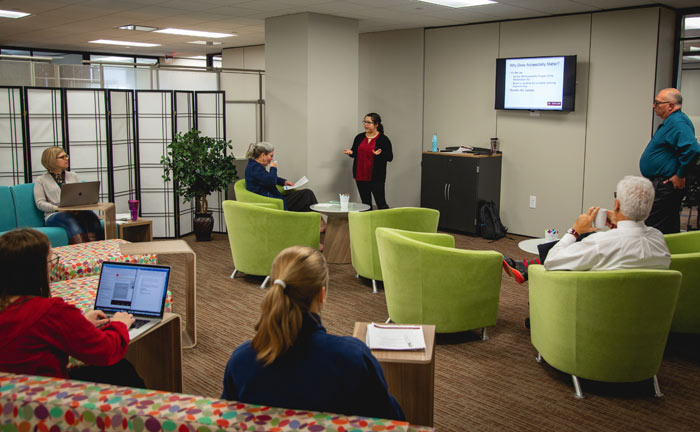This past Tuesday, the Center for Educational Technologies, in partnership with Instructional Technology Services (ITS) welcomed you to our third installment of the Lunch & Learn Series, entitled “10 Tips for Creating Accessible Course Content.” In the final edition of this three-part series, we discussed universal design and what it means for educators within the classroom. During the workshop, we worked alongside Isabel Elizalde of Instructional Technology Services and Tim Ponder of the Center for Educational Technologies to practice and review the definition of universal design, as well as different methods for ensuring that your content is accessible to all learners.
“Addressing accessibility is an issue shared by all who rely on digital content. Beyond the legal considerations, accessibility of digital content is a component of good design and delivery, potentially enhancing all users’ educational experience.” -Tim Ponder, Instructional Technologist for Center for Educational Technologies
Universal design involves creating products and spaces such that they can be utilized by the largest number of individuals possible, regardless of ability. By incorporating universal design strategies within our courses, we are supporting a wider range of students in meeting their individual academic goals. For many, we often view accommodations as adjustments we make for a small population of people that request these changes. However, we often find that these changes not only benefit the users requesting it, but they also can benefit all users on some level. Through the workshop, we were given numerous examples of simple ways we can make our course content more accessible to our students. Additionally, we explored how and why these simple changes are needed to ensure that all students, regardless of ability, have equal access to learning within the classroom.

Key takeaways from the session include:
- At Texas A&M the most common recognized disability is ADHD, and there are steps we can take to support these students when creating content or setting up our classrooms.
- Most Microsoft and Adobe products have Accessibility Checkers embedded within them.
- Creating accessible course content not only supports learners with recognized disabilities, but also supports those who have learning challenges that are not covered by Section 504
- Providing accessible content is the law per Section 504 of the Rehabilitation Act.
- Universal design ensures that every student has an equitable learning experience or equal opportunity to achieve the course outcome.
“Universal design options that enhance all student learning was new for me, but how valuable is that. I am already revising my lecture material!” -Larry J. Suva, PhD. Professor and Department Head, Department of Veterinary Physiology and Pharmacology
Overall, the session was a clever combination of lecture, discussion, and examples, with attendees having the opportunity to reflect on their own course content and consider where changes can be made to make the content more accessible to students.
“The presentation today highlighted the ways in which universal accessibility can enhance teaching to all types of learners, including layering of content such that learning is more active for the student, even (or especially) in a digital format. I also learned some common, easy ways to improve accessibility for documents. I recommend it for anyone producing documents for consumption by students, staff, or the public.” -Elizabeth Crouch, PhD., Associate Dean for Undergraduate Education, College of Veterinary Medicine and Biomedical Sciences
In supplement to today’s session, Instructional Technology Services will be hosting open hours for one-on-one consultations to support faculty in their efforts to create accessible course content. These open hours are available to any faculty member interested in meeting with a consultant, per the schedule below:
Tuesday, December 18, 2018 from 1PM – 4PM
Center for Educational Technologies suite
Enjoy a one-on-one consultation on how you can create accessible course content! Bring your laptop, course materials (i.e. syllabi, presentations, online course material, etc.) and your questions, and let an ITS team member work with you to review different methods for ensuring that your content is accessible to all learners.
Be on the lookout for more Lunch n’ Learn sessions in the new year hosted by the Center for Educational Technologies!